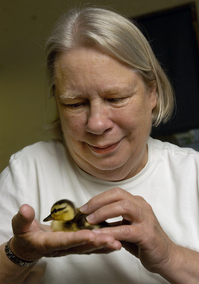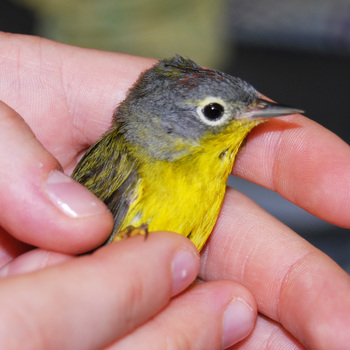Ann Arbor area wild bird rehabilitators open their season already at capacity
Ann Arbor’s only wild bird rehabilitation facility headed into the holiday weekend — its busiest of the year — with mounting challenges.
Spring has brought a glut of injured birds to the Bird Center of Washtenaw County before it opened for the season May 6, which means the center must juggle training volunteers and raising money while caring for a bird population that is already more than what it can easily handle.

Carol Akerlof, shown with a mallard duckling in 2009, is the director of the Wild Bird Center of Washtenaw County.
File photo | Ann Arbor News
On Monday, “we took in 22 birds, and we suddenly went up to 89 birds. And basically, that’s about what we can handle and still give good bird care. We have, on occasion, gone as high as 120, but things fall through the cracks when you have that many birds. What we have mostly now is baby birds that would normally be in nests or baby birds that have been caught by cats.”
By Sunday just before noon, the center was caring for 108 birds, said Akerlof.
The nonprofit, which began with a handful of volunteers working from their homes in 2004, has operated out of a 700-square-foot polling station on Mary Street between May and August each year since 2005. Each year, it must wait until the end of May election proceedings before it opens, Akerlof explained.
The center receives some foundation grants but mostly subsists on donations from people who bring in birds. Its 11 student interns are mostly paid minimum wage. Akerlof herself does not take a salary.
Staff members tend to baby birds displaced from their nests or injured by cats. They administer antibiotics, perform basic wound care, warm and rehydrate birds, and feed them. They refer birds to veterinarians when necessary or for euthanasia when birds can’t be saved.
Akerlof said recent high winds have played a part in dislocating baby birds from their nests, as have homeowners who trim shrubs or trees, not knowing they house nests. Some deliberately remove nests and bring them to the Bird Center, which does not accept nests. But cats are the biggest problem.

This Nashville warbler was caught by a cat in Ann Arbor and was being cared for by the Bird Center of Washtenaw County. It will be released today if the weather is good, said director Carol Akerlof. "Its migration has been interrupted, but experts tell us that it will find its way north to its intended destination," she said Sunday. "I worry, however, that it will be arriving late after the others have chosen mates and perhaps are already nesting."
Courtesy of Carl Akerlof
“Birds are on the decline almost everywhere, and some species are more in decline than others,” Akerlof said.
“Basically, we are trying to raise environmental awareness of the public. When people call us, we don’t just speak with them for a minute or so, we try to take the time to educate them. It’s amazing how much people don’t know about birds,” she said.
Here are Akerlof’s tips for helping wild birds:
- Keep cats indoors. Or, if cats must go outside, buy a leash or construct a barrier to keep them away from birds. Akerlof pointed to a recent study that found that cats pose a serious threat to birds in populated areas. Plus, she said, indoor cats aren’t exposed to viruses that harm outdoor cats.
- If you find a bird on the ground or in obvious trouble, call the Bird Center for advice immediately at 734-761-9640. The center is open from May through August, seven days a week from 7 a.m. to 9 p.m. This time of year, Akerlof explained, fledglings are often on the ground, having just left the nest but unable to fly.
- Before you trim any trees or bushes, watch them for an hour. If you see birds flying in and out of a tree even once during the hour, there may be a nest inside. If so, reschedule your trimming. If you can identify the bird, the Bird Center can tell you when it’s safe to start trimming.
- Don’t remove nests. Many birds are federally protected, and removing their nests is illegal.
- Slow down and drive carefully to avoid running over birds.
- Buy window decals at a local bird store to place on the outside of windows that birds commonly strike.
- Tell your children not to touch wildlife. Akerlof is concerned about a strain of avian rabies identified as close as Cleveland.
Contact Sven Gustafson at sventg123@gmail.com, or follow him at twitter.com/sveng. AnnArbor.com copy editor/news producer Kelly Davenport contributed to this report.


Comments
mkm17
Tue, May 31, 2011 : 2:43 a.m.
Drivers should always operate their vehicles carefully, but I don't agree that vehicles should be driven with special care so that birds or other animals are not run over. Accidents can occur specifically because drivers swerve to avoid domestic or wild animals. Bird Center should not be giving driving tips, especially a tip to "slow down" if that means slower than other traffic in your lane or much slower than the speed limit.
Lotty
Tue, May 31, 2011 : 2:26 a.m.
Perhaps one of you lovely people can suggest how to discourage birds from nesting in a certain area that would be bad for them. I have a pair of barn swallows that are attempting to take up residency directly on the front door to the house. This is the only door entrance/exit to the building, unless I want to climb out windows all summer. I don't want to harm the birds and I know swallows are protected, but this could be a problematic situation so I would like to stop them from getting any further.
arborani
Mon, May 30, 2011 : 11:23 p.m.
The Bird Center staff members are dedicated, hardworking people doing a great job with very limited resources. I have had personal experience with their quick response to calls about birds "in trouble." They earn and deserve whatever support we can offer them.
salfek
Mon, May 30, 2011 : 11:23 p.m.
@ Gloriagirl - red winged black birds are protected - they are a migratory, and protected under the Federal Migratory Bird Treaty Act.
tdw
Mon, May 30, 2011 : 7:17 p.m.
Well this is somewhat off topic but there is a Peregrine falcon that visits my neighborhood.( off Packard between Hewitt and Golfside )In fact a few days ago it was in front of my house about 10ft between the road and the house.It was munching on a bird.I wounder if it was one of those living in the former Bell Tower
Gloriagirl
Mon, May 30, 2011 : 2:57 p.m.
Not just cats are a problem but I live in a Belleville neighborhood where high school boys have shot at red wing black birds injuring them walking around the neighborhood with a bebe gun. Is there anything we can do about this? It seems unconsciencible kids and their parents let them kill small creatures. Is there any law that could be enforced? help!
TexasGirl
Mon, May 30, 2011 : 10:08 p.m.
Is it not illegal to fire a bb gun within city limits? If not it may fall under animal abuse. I think you could call the police to report it.